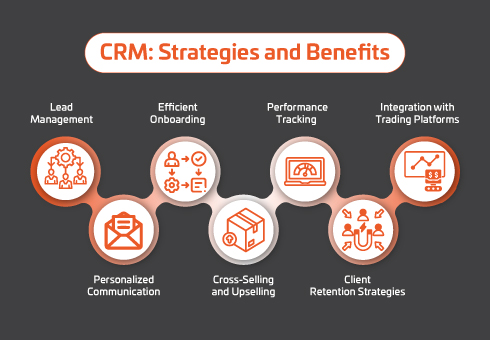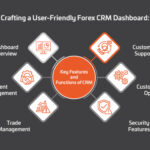- April 10, 2024
- by TradeSoft
- CRM Solution
- 0 Comments
CRM (Customer Relationship Management) systems play a crucial role in increasing sales in the Forex industry by providing tools and functionalities that streamline processes, enhance customer relationships, and optimize sales strategies. Here’s how CRM helps in increasing sales in Forex:
1. Lead Management: CRM systems allow Forex brokers to capture, organize, and manage leads effectively. By centralizing lead information and tracking interactions, brokers can prioritize leads based on their trading behavior and preferences, enabling targeted and personalized communication to nurture prospects and convert them into clients.
2. Personalized Communication: CRM systems enable brokers to segment clients based on various criteria such as trading activity, account size, and trading preferences. With this segmentation, brokers can send targeted and personalized communication, including market updates, trading signals, and promotional offers, tailored to each client’s needs and interests, thereby increasing engagement and sales opportunities.
3. Efficient Onboarding: CRM systems streamline the client onboarding process by automating tasks such as account setup, verification, and funding. By providing a seamless onboarding experience, brokers can reduce friction in the client acquisition process, shorten the time to first trade, and increase the likelihood of converting leads into active traders.
4. Cross-Selling and Upselling: CRM systems enable brokers to identify cross-selling and upselling opportunities by analyzing client trading patterns and behavior. By understanding clients’ needs and preferences, brokers can recommend additional products or services that complement their trading activities, thereby increasing sales and maximizing client value.
5. Performance Tracking: CRM systems provide brokers with insights into sales performance through real-time analytics and reporting. By tracking key performance metrics such as lead conversion rates, client acquisition costs, and lifetime value, brokers can assess the effectiveness of their sales strategies, identify areas for improvement, and optimize their approach to drive sales growth.
6. Client Retention Strategies: CRM systems help brokers implement client retention strategies by identifying at-risk clients and proactively addressing their needs. By monitoring client engagement, satisfaction levels, and trading activity, brokers can anticipate client churn and take proactive measures to retain clients through targeted communication, personalized support, and loyalty programs.
7. Integration with Trading Platforms: CRM systems can be integrated with trading platforms to provide a seamless experience for clients. By enabling features such as account synchronization, real-time trading data, and automated trade execution, brokers can enhance the overall trading experience, increase client satisfaction, and encourage repeat business.
Overall, CRM systems play a vital role in increasing sales in the Forex industry by facilitating efficient lead management, personalized communication, streamlined onboarding, cross-selling and upselling, performance tracking, client retention, and integration with trading platforms. By leveraging CRM effectively, Forex brokers can optimize their sales processes, enhance client relationships, and drive sales growth in a competitive market.



